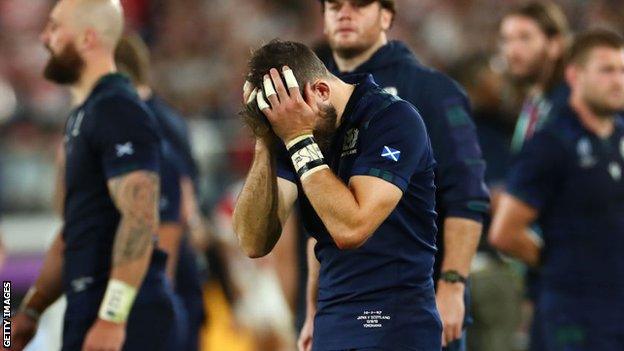'SRU chief Mark Dodson has the money will never escape the flak that goes with it'
- Published

Scotland underperformed at the 2019 Rugby World Cup, failing to make it out of their group
It's hard to know what caused the biggest tremor in Scotland this week - the winds of Storm Brendan whipping around the country or the thud of Mark Dodson's wallet landing on his desk at Murrayfield.
Already on a hefty annual salary of £455,000 a year for running Scottish rugby - more than three times the wage Nicola Sturgeon gets for running Scotland - there was the revelation that the chief executive at Murrayfield pocketed an extra £478,000 in bonuses, accrued over three years and paid in one lump sum in 2019, bringing his grand total earnings to £933,000, a wad of cash so thick it would choke an elephant.
Dodson was one of the most, if not the most, lavishly rewarded rugby chief executives in the global game last year. To put it into context, Philip Browne, chief executive of the IRFU, is paid in the region of £175,000 off a turnover of £74m, Martyn Phillips, chief executive of the WRU, is paid £351,000 off a turnover of £90.5m and Bill Sweeney, chief executive of the RFU, is paid around £500,000 off a turnover of £213m.
It's hard to know the bonus structures - or long-term incentive plans (LTIPs) - that his counterparts have built into their contracts, but on basic salary alone Dodson is paid significantly more than Browne and Phillips and marginally less than Sweeney despite producing a dramatically smaller turnover. And that's discounting the extras.
A near half million bonus for what?
The £455,000 basic salary takes some justifying on its own - no player on Scotland's books has ever been paid close to that much - but the extra £478,000 on top has left many rugby fans in this country, and further afield, confused and aghast. Everybody is taking pot-shots at Dodson but who in his position wouldn't accept what's offered? It's the SRU's remunerations committee that gave him the deal in the first place. Is he supposed to say no? Should he give the money back? Would anybody?
A near £500,000 bonus for what, though? The three years that the bonus covers haven't exactly been awash with on-field success. Beyond a Calcutta Cup, no trophies were won and only one final was made. Most recently, in 2019, the national team bombed in the Six Nations and bombed again at the World Cup.
Dodson could legitimately argue that beyond funding the operation better than any Scottish team has ever been funded before, there's not a lot else he could have done about a lousy 2019. That's on the coaches and the players. And it is. But he'll find it incredibly hard now to rid himself of the tag of the near million pound man.
It will follow him around. Every time a hard-working club struggles to find the money to keep the show on the road they can say that things might be better had Dodson not hoovered up all the dough. How many development officers could the SRU have employed using only Dodson's bonus money? How many clubs could have done with a slice of that action? Categorically, the money would not have kept Finn Russell, Stuart Hogg or Jonny Gray at Glasgow, that needs to be said. But a marquee player could have been enticed as a replacement.
Rugby folk would probably draw up a list of uses for £478,000 that stretches around the perimeter of the pitch at Murrayfield. Giving it all to Dodson wouldn't make the top thousand suggestions.
While thundering at the extraordinary munificence of the remunerations committee we should think about possible reasons why they've shown Dodson such largesse. The targets that he hit, and which triggered the bonus, will include a reduction in SRU debt and an increase in turnover, from £33m in 2011 when he took over to £61m in 2019, brought on, in part, by 15 consecutive sell-outs at Murrayfield.
Dodson's supporters know his strengths
Dodson is a forceful and accomplished deal-maker and, along with his fellow chief executives from the other nations, he has been in the vanguard of negotiations with private equity firms over the last three years, negotiations that look set to bear fruit. CVC Capital are close to securing part ownership of the Pro14 and the Six Nations and the finances involved are eye-watering to a union the size of the SRU.
It's possible that Murrayfield will benefit to the tune of tens of millions if it all goes through. Dodson has been banging the drum about this for years. He deserves a lot of credit for it. There's no question that he's done huge work in bringing more money into the organisation at a time when things are hard out there. On Tuesday, the All Blacks lost their main sponsor, AIG. Even for a brand that strong, there are no certainties.
Dodson has weaknesses and enemies - he's likely to have more of them now that everybody knows the kind of cash he's commanding - but he's also got supporters on the union who recognise his strengths and are convinced that he'll be poached if they don't lock him down. Like him or not, there's probably truth in that.
Nobody understands bottom lines quite like Dodson. He's got the money but he'll probably never escape the flak that goes with it. He will see it as unfair and has said before that in the eyes of some he will never credit for the things that he's done well. In truth, getting a kicking comes with the territory. It's never bothered him. In any event, he can now stuff all those notes down his trousers to cushion the blows.
